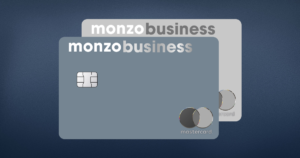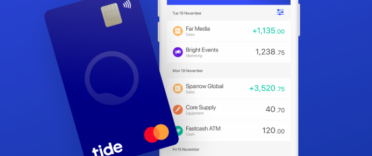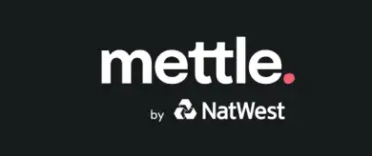In this independent Monzo Business review, we take a look at how the app-based bank account works and what features are on offer for businesses. We also explore alternatives including challenger banks like Starling* and high street options like Lloyds.
What is Monzo Business?
 Monzo has built a popular app for personal users to manage their current accounts, set budgets and monitor their spending easily from a smartphone and it entered the business banking space back in 2020. Since then, its customers voted it the Best Business Banking Provider in the 2023 British Bank Awards.
Monzo has built a popular app for personal users to manage their current accounts, set budgets and monitor their spending easily from a smartphone and it entered the business banking space back in 2020. Since then, its customers voted it the Best Business Banking Provider in the 2023 British Bank Awards.
Its current business bank accounts are open to UK-based sole traders or limited companies that only pay tax in the UK. Limited companies must be active on Companies House with an active company director and at least one person of significant control. This aims to eliminate complicated structures where a business could be owned by several other companies. Limited companies must also make money mostly from selling goods or services, not from interest or investment income.
The app doesn’t currently support other business structures such as partnerships, charities, Limited companies by guarantee, Public Limited companies, trusts or funds. There is also a long list of industries that Monzo won’t provide accounts for such as construction, consumer credit and business involved with gambling and weapons. You can view the full list on the Monzo website.
How does Monzo Business work?
Monzo is an online challenger bank with no branches. This means you can sign up straight away by downloading the app and choosing to open a business account. If you are an existing Monzo personal account user, you can apply for a Monzo Business account within the app.
Signing up is a quick process compared to having to make an appointment in a bank branch and dragging along a load of paperwork. New users will need to verify their email and phone number and enter their personal details. There are also anti-money laundering and credit reference checks so have some ID ready to upload and prepare to take a selfie to confirm who you are.
Once your account is approved, you will need to enter details including the sector you work in, the type of business you run and how you receive your income, such as in cash or through bank transfers.
If your business account application is approved, you can start using the account straight away and users can also switch to Monzo through the Current Account Switch Service. For more information on a Monzo current account read our independent Monzo review.
Monzo Business account features
- Business debit card - Get a navy blue Monzo business card with a hot coral finish
- Instant notifications - Receive instant notifications when a payment has been made
- Digital receipts - Upload receipts as you go
- Categorise spending - manage spending and budgets with payment categories
- Savings pots - separate your money into pots
- Invoices - create and send invoices via the app or on the web page (Pro account only)
- Tax pots - Put money aside for tax bills with tax pots. You can choose to transfer money manually or set aside an automatic amount each month (Pro account only)
- Multi-user access - Limited companies can add up to two other people to access and manage the account. All three users will be able to make payments, see incoming and outgoing payments and edit account information (Pro account only)
- Mobile and web access - Access your account from both your phone and computer. The web app lets you pay people, export statements and see your transaction history, while you can do this and other important tasks through the mobile app such as setting alerts, sending invoices and uploading receipts.
- Accountancy tools - Integrate software such as Xero, FreeAgent and QuickBooks so you or your accountant can easily keep track of financial information to help with balancing the books (Pro accounts only)
- 24/7 customer support - Chat to customer services at any time via the app, over the phone or email
- Fee-free spending abroad - Spend abroad with no additional fees
- Instant UK bank transfers - Move money between UK accounts for free
- FSCS protection - Your money is protected up to £85,000 with the Financial Service Compensation Scheme
How much does Monzo Business cost?
Monzo offers two business account options and we break down the features of each account in the table below:
| Monzo Lite | Monzo Pro | Monzo Team | |
| Monthly cost | FREE | £9 | £25 |
| Monzo current account benefits (including instant notifications and fee-free spending abroad) | YES | YES | YES |
| Instant access savings pots | YES | YES | YES |
| Insights | YES | YES | YES |
| Expense cards | NO | NO | YES |
| Payment approvals | NO | NO | YES |
| Bulk payments | NO | NO | YES |
| Mobile and web access | YES | YES | YES |
| Digital receipts | YES | YES | YES |
| Integrated accounting | NO | YES | YES |
| Tax pots | NO | YES | YES |
| Multi-user access | NO | YES | YES |
| Invoicing | NO | YES | YES |
| Exclusive offers | NO | YES | YES |
| Virtual cards | NO | YES | YES |
| Auto-export transactions | NO | YES | YES |
| Card payments with Stripe | YES | YES | YES |
| FSCS protection | YES | YES | YES |
The bank charges £1 to pay in cash at PayPoint or Post Office and you can deposit up to £1,000 every 6 months and up to £300 at any time. There are no charges for ATM withdrawals inside the European Economic Area (EEA) as long as Monzo is your main business account. You can take out £200 cash for free every 30 days outside the EEA and there is a charge of 3% thereafter. For international transfers, you will need to pay a Wise transfer fee.
Is Monzo’s Business account safe?
Monzo is fully regulated by the Financial Conduct Authority (FCA) so must follow rules on separating client money, being clear about charges and treating customers fairly. Up to £85,000 of your money is protected by the Financial Services Compensation Scheme so if Monzo becomes insolvent you also have a right to complain to the Financial Ombudsman Service.
Monzo Business - customer reviews
Monzo has an overall Trustpilot rating of 4.4 out of 5.0 based on more than 40,000 reviews. Approximately 78% of reviewers gave Monzo a 5-star review, while around 13% gave Monzo a 1-star review. Business customers who gave Monzo five stars raved about the easy app navigation and helpful features like tax pots and accounting features. However, other business customers who gave the bank a one-star rating complained about the lack of customer service they faced and issues with their accounts being frozen when customers paid invoices.
Monzo vs alternative business accounts
| Monzo Business | Starling Bank Business* | Tide Business* | Revolut Business | |
| Monthly cost |
|
|
|
|
| Free UK transfers | YES | YES | NO | limits apply |
| Free ATM withdrawals | YES | YES | NO | NO |
| Fee-free spending abroad | YES | YES | NO | NO |
| Categorised spending | YES | YES | YES | YES |
| Integrated accounting | NO Only with Monzo Pro | YES | YES | YES |
| Free invoicing | NO Only with Monzo Pro | YES | YES (up to 3 invoices per month) | YES |
| 24/7 customer support | YES | YES | NO | YES |
| Cash deposits | YES | YES | YES | NO |
| Cheque deposits | YES | YES | NO | NO |
| Trustpilot score | 4.4 out of 5.0 | 4.3 out of 5.0 | 4.0 out of 5.0 | 4.3 out of 5.0 |
^limits on free transactions for premium accounts
Monzo Business vs Starling Bank Business
Starling Bank* offers much of the same service as Monzo's paid-for 'Pro' option but for free. Monzo's tax pots feature in its Pro business account is useful and unique, although Starling Bank offers a Business Toolkit that costs £7 a month and offers bookkeeping and VAT management. However, if you deposit cash, Starling may work out more expensive at 0.7% per transaction (minimum of £3) rather than the £1 you pay with Monzo. For more information on the Starling Bank business account check out our 'Starling Business review'.
Monzo Business vs Tide Business
Monzo offers more features and its paid-for 'Pro' version is cheaper than Tide’s offering. Tide* can also be pricey if you are making a lot of transfers at 20p a time. Tide does offer a legal helpline with its Plus service, which could come in handy if you need support drafting documents or work in a particularly litigious sector. For more information on the Tide business account check out our 'Tide Review'.
Monzo Business vs Revolut for Business
Monzo offers more extras with its business account but Revolut is useful for those holding multiple currencies or those who are not solely UK-based, so could be better for companies operating internationally. Like Monzo, Revolut does offer free business accounts but there is the option to upgrade to a subscription account if you would like additional features and less spending restrictions. Revolut's business accounts are only open to businesses rather than freelancers and sole traders. However, Revolut does offer a Revolut Pro account for those registered as self-employed. For more information on Revolut Business accounts check out our 'Revolut Business' review.
Monzo Business vs high street business bank accounts
| Monzo Business | Lloyds Business | NatWest Business | |
| Monthly cost |
|
|
|
| Free UK transfers | YES | YES | Free for 24 months then £0.35 |
| Free ATM withdrawal | YES | YES | Free for 24 months then £0.35 |
| Fee-free spending abroad | YES | NO | NO |
| Categorised spending | YES | NO | YES |
| 24/7 customer support | YES | YES | YES |
| Cash deposits | YES | YES | YES |
| Cheque deposits | YES | YES | YES |
Opening a business account has traditionally been a long-winded process that involves arranging a branch appointment during opening hours and bringing along paperwork to be assessed by the local bank manager.
Banking apps such as Monzo take away a lot of the time and hassle involved as you can apply online at any time of day and get a quick decision rather than making you wait for weeks as some high street lenders do.
Monzo offers a lot more than mainstream high street banks with lower monthly fees and far more fintech-focused extras to actually help you manage your business. There are downsides though as you have to be technologically savvy enough to manage most of your business finances through an app or on a computer. There is no bank manager you can go and see with any queries, instead you have to phone a contact centre. It may also not be best for those getting paid in lots of cash as there are limits on how much you can deposit each time.
Pros and cons of Monzo Business
Below, we've outlined the pros and cons of a Monzo business bank account.
Pros of Monzo Business
- Quick setup - Download the app and sign up for a personal and business account within minutes
- Fee-free spending at home and abroad - No charges wherever you spend your money
- Accountancy integration - Send invoices, store receipts and get everything organised for HMRC
- Save for tax - Make sure you are saving enough for tax bills such as corporation tax
- Spending alerts - Keep track of money coming in and out without having to constantly log in to your account
Cons of Monzo Business
- Deposit limits - You can only pay in up to £300 in one go and up to £1,000 every six months
- App-only - There is no branch you can drop into with queries and everything has to be managed from your phone or the desktop app
- Eligibility restrictions - Monzo’s accounts are mainly aimed at UK-based businesses and focused on sole traders and limited companies (and there are some sectors that are excluded)
Summary
Monzo’s business bank account is a great way for UK-based entrepreneurs, whether sole traders or limited companies, to manage their firm’s finances. It's an app-based bank which allows entrepreneurs to access information quickly and efficiently while on the move. Features like the tax pots make it easy to budget for tax season, and integrated accounting and invoicing options make Monzo Pro a good option for those willing to pay for their business account. All in all, Monzo is a highly-rated online business bank account that offers many of the features you might expect from a traditional bank.
If a link has an * beside it this means that it is an affiliated link. If you go via the link Money to the Masses may receive a small fee which helps keep Money to the Masses free to use. The following link can be used if you do not wish to help Money to the Masses or take advantage of any exclusive offers – Starling Bank, Tide




